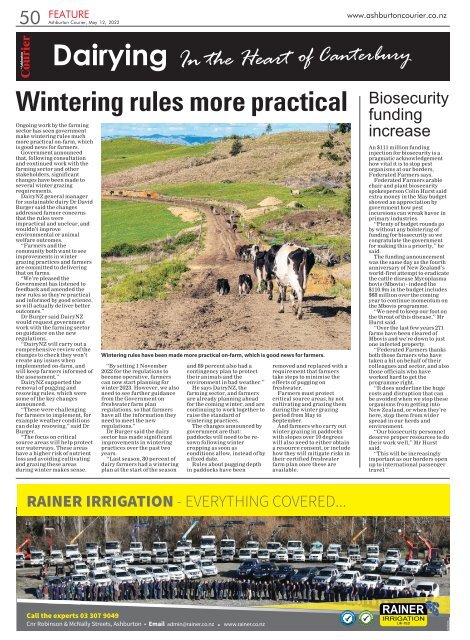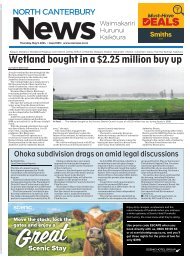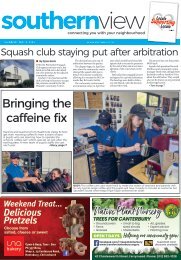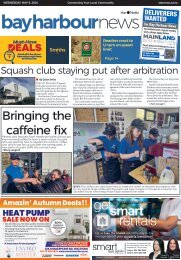Ashburton Courier: May 12, 2022
You also want an ePaper? Increase the reach of your titles
YUMPU automatically turns print PDFs into web optimized ePapers that Google loves.
FEATURE<br />
50 <strong>Ashburton</strong> <strong>Courier</strong>, <strong>May</strong> <strong>12</strong>, <strong>2022</strong><br />
www.ashburtoncourier.co.nz<br />
Dairying In the Heart of Canterbury<br />
Wintering rules more practical<br />
Ongoing work by the farming<br />
sector has seen government<br />
make wintering rules much<br />
more practical onfarm,which<br />
is goodnewsfor farmers.<br />
Government announced<br />
that, following consultation<br />
andcontinuedwork withthe<br />
farming sector and other<br />
stakeholders, significant<br />
changes have beenmade to<br />
several winter grazing<br />
requirements.<br />
DairyNZ general manager<br />
for sustainable dairy Dr David<br />
Burgersaid the changes<br />
addressed farmer concerns<br />
that the rules were<br />
impractical and unclear, and<br />
wouldn’t improve<br />
environmental or animal<br />
welfare outcomes.<br />
‘‘Farmers and the<br />
community both wanttosee<br />
improvements in winter<br />
grazingpractices andfarmers<br />
are committed to delivering<br />
that on farms.<br />
“We’repleased the<br />
Governmenthas listened to<br />
feedbackand amended the<br />
newrules so they'repractical<br />
andinformedbygoodscience,<br />
so willactually deliver better<br />
outcomes.”<br />
Dr Burgersaid DairyNZ<br />
would request government<br />
workwiththe farmingsector<br />
on guidance on thenew<br />
regulations.<br />
‘‘DairyNZ willcarryout a<br />
comprehensive review of the<br />
changes tochecktheywon’t<br />
create any issueswhen<br />
implemented onfarm,and<br />
will keep farmers informed of<br />
the assessment.”<br />
DairyNZsupported the<br />
removalofpugging and<br />
resowing rules, whichwere<br />
some ofthe key changes<br />
announced.<br />
‘‘These werechallenging<br />
forfarmerstoimplement, for<br />
example weatherconditions<br />
candelayresowing,” said Dr<br />
Burger.<br />
“The focus on critical<br />
source areaswillhelpprotect<br />
ourwaterways. These areas<br />
have ahigher riskofnutrient<br />
lossand avoiding cultivating<br />
andgrazing these areas<br />
during winter makessense.<br />
Wintering rules have been made more practical onfarm, which is good news for farmers.<br />
“By setting 1November<br />
<strong>2022</strong>for the regulations to<br />
become operative, farmers<br />
can now start planning for<br />
winter 2023. However, we also<br />
need to seefurther guidance<br />
fromthe Governmenton<br />
freshwater farmplan<br />
regulations, so thatfarmers<br />
have all the information they<br />
need to meet thenew<br />
regulations.”<br />
Dr Burgersaid the dairy<br />
sector has made significant<br />
improvements in wintering<br />
practicesoverthe pasttwo<br />
years.<br />
‘‘Last season,80percent of<br />
dairy farmers had awintering<br />
planatthe startofthe season<br />
and 89 percentalsohad a<br />
contingency plan to protect<br />
their animals andthe<br />
environmentinbadweather.”<br />
He saysDairyNZ, the<br />
farming sector, andfarmers<br />
are alreadyplanningahead<br />
forthe comingwinter, and are<br />
continuing to work togetherto<br />
raise thestandardof<br />
wintering practices.<br />
The changes announced by<br />
government are that:<br />
paddocks willneed to be resownfollowing<br />
winter<br />
croppingassoonas<br />
conditionsallow,insteadofby<br />
afixeddate.<br />
Rulesabout pugging depth<br />
in paddocks have been<br />
removed andreplaced with a<br />
requirement that farmers<br />
take steps to minimise the<br />
effects of puggingon<br />
freshwater.<br />
Farmers must protect<br />
criticalsource areas,bynot<br />
cultivating andgrazing them<br />
duringthe winter grazing<br />
period from <strong>May</strong>to<br />
September.<br />
Andfarmerswho carry out<br />
winter grazing in paddocks<br />
with slopes over 10 degrees<br />
will alsoneedtoeither obtain<br />
aresourceconsent, or include<br />
how theywillmitigaterisks in<br />
theircertified freshwater<br />
farmplanoncethese are<br />
available.<br />
Biosecurity<br />
funding<br />
increase<br />
An $111 million funding<br />
injectionfor biosecurity is a<br />
pragmaticacknowledgement<br />
how vital it is to stoppest<br />
organisms at ourborders,<br />
FederatedFarmers says.<br />
FederatedFarmers arable<br />
chair and plantbiosecurity<br />
spokesperson Colin Hurstsaid<br />
extra money in the<strong>May</strong> budget<br />
showedanappreciationby<br />
government how pest<br />
incursions can wreak havocin<br />
primary industries.<br />
‘‘Plenty ofbudget rounds go<br />
by withoutany bolstering of<br />
funding for biosecurity so we<br />
congratulatethe government<br />
for making this apriority,’’ he<br />
said.<br />
The funding announcement<br />
was the same day as thefourth<br />
anniversary ofNew Zealand’s<br />
worldfirst attempt to eradicate<br />
the cattle diseaseMycoplasma<br />
bovis(Mbovis) indeed the<br />
$110.9minthe budget includes<br />
$68 million overthe coming<br />
yeartocontinue momentumon<br />
the Mbovis programme.<br />
‘‘We needtokeep our foot on<br />
the throat of this disease,’’ Mr<br />
Hurst said.<br />
‘‘Overthe last few years 271<br />
farms have been cleared of<br />
Mbovis and we’re down to just<br />
one infected property.<br />
‘‘FederatedFarmers thanks<br />
both those farmers who have<br />
taken ahit on behalf of their<br />
colleagues and sector, and also<br />
those officials who have<br />
workedhard to get the<br />
programme right.<br />
‘‘It does underlinethe huge<br />
costs anddisruption that can<br />
be avoidedwhenwe stop these<br />
organisms from getting into<br />
New Zealand, or when they’re<br />
here, stopthem from wider<br />
spread in our herds and<br />
environment.<br />
‘‘Our biosecurity personnel<br />
deserve proper resources to do<br />
their work well,’’MrHurst<br />
said.<br />
‘‘This will be increasingly<br />
importantasour borders open<br />
up to internationalpassenger<br />
travel.’’<br />
admin@rainer.co.nz • www.rainer.co.nz<br />
2479765 2301725


















